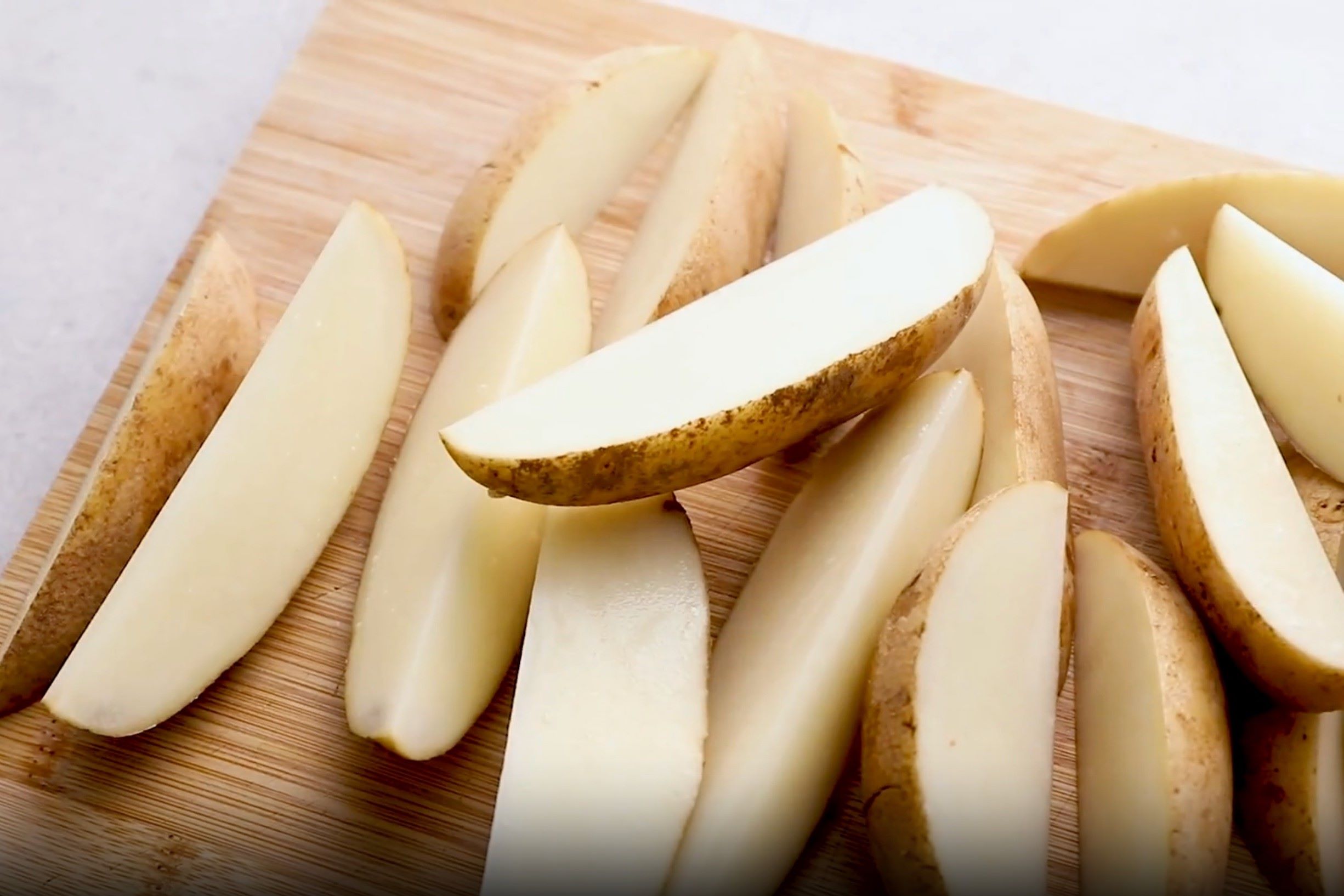Home>Home and Garden>The Top Fertilizers For Optimal Potato Growth


Home and Garden
The Top Fertilizers For Optimal Potato Growth
Published: February 17, 2024
Discover the best fertilizers for your home garden to achieve optimal potato growth. Find out how to nourish your potato plants for a bountiful harvest.
(Many of the links in this article redirect to a specific reviewed product. Your purchase of these products through affiliate links helps to generate commission for Noodls.com, at no extra cost. Learn more)
Table of Contents
Introduction
Potatoes are a staple food in many households, prized for their versatility and nutritional value. Whether mashed, fried, or baked, these humble tubers have secured a permanent place on dinner tables around the world. However, achieving a bountiful potato harvest requires more than just planting and watering. The key to cultivating healthy, robust potato plants lies in providing them with the right nutrients, and this is where fertilizers play a crucial role.
In this comprehensive guide, we will explore the top fertilizers essential for optimal potato growth. From nitrogen-based to phosphorus-based and potassium-based fertilizers, we will delve into the specific nutrients that potatoes require at different stages of their growth. Additionally, we will discuss the benefits of organic fertilizers and the best practices for applying them to ensure a successful potato harvest.
By understanding the significance of using the right fertilizers and implementing proper fertilization techniques, both novice and experienced gardeners can elevate their potato cultivation endeavors to new heights. So, let's embark on this journey to uncover the secrets of nurturing thriving potato plants through the power of fertilizers.
Importance of using the right fertilizer for potato growth
Selecting the appropriate fertilizer is paramount for fostering robust potato growth and ensuring a plentiful harvest. Potatoes, being heavy feeders, necessitate a balanced and targeted supply of essential nutrients throughout their growth stages. The right fertilizer not only bolsters the plants' overall health but also enhances their resistance to diseases and pests, thereby contributing to a thriving potato crop.
In the initial stages of growth, potatoes require a nitrogen-rich fertilizer to facilitate the development of lush foliage and sturdy stems. This nutrient is vital for promoting vigorous vegetative growth, which is crucial for the plant's ability to harness sunlight and convert it into energy through photosynthesis. As the potato plants progress to the flowering and tuber formation stages, phosphorus becomes instrumental in fostering robust root development and encouraging the production of healthy, sizable tubers. Furthermore, potassium plays a pivotal role in enhancing the plant's resilience to environmental stressors, bolstering disease resistance, and promoting overall plant vigor.
By utilizing the right combination of nitrogen, phosphorus, and potassium, gardeners can ensure that their potato plants receive a well-rounded nutritional foundation, setting the stage for optimal growth and productivity. Moreover, organic fertilizers offer a sustainable and environmentally friendly approach to nourishing potato plants, enriching the soil with a diverse array of nutrients while fostering long-term soil health.
In essence, the significance of using the right fertilizer for potato growth cannot be overstated. It is the cornerstone of a successful potato cultivation endeavor, influencing not only the quantity but also the quality of the harvest. By providing potatoes with the precise nutrients they require at each stage of their growth, gardeners can foster resilient, high-yielding plants that bear the hallmark of health and vitality.
In the subsequent sections, we will delve into the specific types of fertilizers that cater to the unique nutritional needs of potato plants, equipping you with the knowledge to make informed decisions and elevate your potato cultivation practices to new heights.
Nitrogen-based fertilizers
Nitrogen stands as a fundamental nutrient for the vigorous growth of potato plants, particularly during their early developmental stages. Nitrogen-based fertilizers play a pivotal role in promoting robust foliage and stem development, thereby laying the groundwork for healthy and productive potato plants.
One of the most commonly used nitrogen-based fertilizers is ammonium nitrate, which provides a readily available source of nitrogen for the plants. Its quick-release nature allows for rapid uptake by the potato plants, stimulating lush vegetative growth and ensuring a strong foundation for subsequent stages of development.
Urea, another prevalent nitrogen-based fertilizer, offers an efficient and cost-effective means of supplying nitrogen to potato plants. Its high nitrogen content makes it an ideal choice for bolstering early plant growth, fostering the emergence of dense foliage, and facilitating the efficient utilization of sunlight for photosynthesis.
In addition to these synthetic options, organic nitrogen-based fertilizers, such as composted manure and blood meal, present sustainable alternatives for nourishing potato plants. These organic sources not only supply nitrogen but also contribute to the overall improvement of soil structure and fertility, fostering a balanced and thriving ecosystem for the potato plants to thrive in.
When applying nitrogen-based fertilizers to potato plants, it is crucial to do so judiciously, taking into account the specific growth stage of the plants. During the initial growth phase, a nitrogen-rich fertilizer can be applied to promote robust foliage development. However, as the plants transition to the flowering and tuber formation stages, a balanced approach is essential to prevent excessive vegetative growth at the expense of tuber development.
By understanding the nuances of nitrogen-based fertilization and employing a tailored approach that aligns with the evolving needs of the potato plants, gardeners can harness the power of nitrogen to cultivate healthy, resilient, and high-yielding potato crops.
In the subsequent sections, we will delve into the significance of phosphorus-based and potassium-based fertilizers, exploring their roles in nurturing thriving potato plants and contributing to a bountiful harvest.
Phosphorus-based fertilizers
Phosphorus plays a pivotal role in the development of robust root systems and the promotion of healthy tuber formation in potato plants. As the plants transition from vegetative growth to the crucial stages of flowering and tuber initiation, the availability of phosphorus becomes instrumental in ensuring optimal development and yield.
One of the primary phosphorus-based fertilizers utilized in potato cultivation is diammonium phosphate (DAP). This fertilizer not only supplies a high concentration of phosphorus but also provides a readily available source of nitrogen, further supporting the plants' early growth and development. DAP's balanced composition makes it an ideal choice for bolstering root development and encouraging the initiation of tuber formation, setting the stage for a productive potato crop.
Another prevalent phosphorus-based fertilizer is monoammonium phosphate (MAP), which offers a concentrated source of phosphorus coupled with nitrogen. This combination of essential nutrients facilitates the establishment of robust root systems, enhancing the plants' ability to absorb water and nutrients from the soil. Additionally, MAP contributes to the promotion of early tuberization, laying the groundwork for the subsequent growth and maturation of the potato tubers.
In addition to these synthetic options, organic phosphorus-based fertilizers, such as bone meal and rock phosphate, present sustainable alternatives for enriching the soil with phosphorus. These organic sources not only supply phosphorus but also contribute to the long-term improvement of soil fertility, fostering a conducive environment for healthy root development and tuber formation.
When applying phosphorus-based fertilizers to potato plants, it is essential to consider the specific growth stages and the plants' evolving nutritional requirements. During the early stages of tuber initiation, a targeted application of phosphorus-based fertilizers can significantly influence the development of robust root systems and the initiation of tuber formation, setting the stage for a bountiful potato harvest.
By understanding the significance of phosphorus in potato cultivation and utilizing phosphorus-based fertilizers strategically, gardeners can foster healthy, resilient potato plants with robust root systems and abundant, high-quality tubers. The judicious application of phosphorus-based fertilizers contributes to the overall success of potato cultivation, ensuring a rewarding harvest of nutritious and flavorful potatoes.
Potassium-based fertilizers
Potassium, an essential nutrient for potato plants, plays a pivotal role in bolstering their resilience to environmental stressors, enhancing disease resistance, and promoting overall plant vigor. As potato plants progress through their growth stages, the availability of potassium becomes increasingly crucial in ensuring their ability to withstand adverse conditions and thrive in diverse environments.
One of the primary potassium-based fertilizers utilized in potato cultivation is potassium sulfate, which provides a concentrated source of potassium essential for promoting robust plant growth and development. This fertilizer not only supplies potassium but also contributes to the improvement of soil structure, fostering a conducive environment for healthy root development and tuber formation. The balanced composition of potassium sulfate makes it an ideal choice for enhancing the plants' ability to withstand drought and resist diseases, thereby contributing to the overall resilience and productivity of the potato crop.
Potassium nitrate is another prevalent potassium-based fertilizer that offers a dual supply of potassium and nitrogen, providing a comprehensive nutritional boost for potato plants. This fertilizer's balanced formulation supports the plants' overall health and vitality, contributing to the development of sturdy stems, efficient nutrient uptake, and the promotion of robust tuber formation. Additionally, potassium nitrate plays a pivotal role in enhancing the plants' resistance to environmental stressors, bolstering their ability to thrive in challenging growing conditions.
In addition to these synthetic options, organic potassium-based fertilizers, such as wood ash and kelp meal, present sustainable alternatives for enriching the soil with potassium while fostering long-term soil health. These organic sources not only supply potassium but also contribute to the overall improvement of soil fertility, creating a balanced and thriving ecosystem for the potato plants to flourish in.
When applying potassium-based fertilizers to potato plants, it is essential to consider the plants' specific growth stages and their evolving nutritional requirements. During the crucial stages of tuber development, a targeted application of potassium-based fertilizers can significantly influence the plants' ability to produce healthy, sizable tubers while enhancing their resilience to environmental stressors.
By understanding the significance of potassium in potato cultivation and strategically utilizing potassium-based fertilizers, gardeners can foster healthy, resilient potato plants with robust disease resistance and abundant, high-quality tubers. The judicious application of potassium-based fertilizers contributes to the overall success of potato cultivation, ensuring a rewarding harvest of nutritious and flavorful potatoes.
Organic fertilizers for potato growth
Organic fertilizers offer a sustainable and environmentally friendly approach to nourishing potato plants, enriching the soil with a diverse array of nutrients while fostering long-term soil health. These natural alternatives not only provide essential nutrients for potato growth but also contribute to the overall improvement of soil fertility, creating a balanced and thriving ecosystem for the potato plants to thrive in.
Composted manure stands as a prominent organic fertilizer utilized in potato cultivation, renowned for its rich nutrient content and soil-enhancing properties. Derived from decomposed animal waste and organic matter, composted manure serves as a valuable source of nitrogen, phosphorus, and potassium, supplying a well-rounded nutritional boost for potato plants. Its organic composition fosters the gradual release of nutrients, ensuring a sustained and balanced supply that aligns with the plants' evolving growth stages. Additionally, composted manure contributes to the improvement of soil structure and fertility, enhancing the soil's capacity to retain moisture and nutrients while promoting the proliferation of beneficial soil microorganisms.
Another notable organic fertilizer for potato growth is blood meal, prized for its high nitrogen content and efficient nutrient release characteristics. Derived from dried animal blood, this natural fertilizer offers a concentrated source of nitrogen, supporting robust foliage development and vigorous early growth in potato plants. Its organic nature aligns with sustainable cultivation practices, minimizing the environmental impact while nourishing the plants with essential nutrients. Additionally, blood meal contributes to the enhancement of soil fertility, fostering a conducive environment for healthy root development and tuber formation.
In addition to these organic options, bone meal emerges as a valuable organic fertilizer renowned for its phosphorus content and soil-enriching properties. Derived from finely ground animal bones, bone meal provides a concentrated source of phosphorus, promoting robust root development and facilitating the initiation of tuber formation in potato plants. Its slow-release nature ensures a steady supply of phosphorus, aligning with the plants' increasing demand during critical growth stages. Furthermore, bone meal contributes to the long-term improvement of soil fertility, enriching the soil with essential nutrients and fostering a balanced ecosystem for thriving potato cultivation.
By incorporating organic fertilizers into potato cultivation practices, gardeners can embrace sustainable and eco-friendly approaches to nourishing their plants while promoting long-term soil health. These natural alternatives not only supply essential nutrients but also contribute to the overall well-being of the soil, creating an environment conducive to robust potato growth and a bountiful harvest of high-quality tubers.
Best practices for applying fertilizers to potatoes
When it comes to nourishing potato plants with fertilizers, employing best practices is essential to maximize their growth potential and ensure a bountiful harvest. Here are some key guidelines for applying fertilizers to potatoes:
-
Soil Testing: Before applying fertilizers, conduct a soil test to assess the existing nutrient levels. This analysis provides valuable insights into the specific nutritional requirements of the soil and helps determine the most suitable fertilization approach.
-
Timing: Timing is crucial when applying fertilizers to potatoes. During the initial growth phase, nitrogen-rich fertilizers can be applied to promote robust foliage development. As the plants transition to the flowering and tuber formation stages, a balanced approach is essential to support tuber development without promoting excessive vegetative growth.
-
Even Distribution: Ensure even distribution of fertilizers to facilitate uniform nutrient uptake by the potato plants. This can be achieved through meticulous application techniques, such as broadcasting or banding the fertilizers at the appropriate soil depths.
-
Avoiding Excess: While providing essential nutrients is vital, excessive fertilization can lead to adverse effects on potato plants. Overapplication of fertilizers, particularly nitrogen, can result in excessive vegetative growth at the expense of tuber development. Adhere to recommended application rates to prevent nutrient imbalances and promote balanced plant growth.
-
Incorporation into Soil: After applying fertilizers, gently incorporate them into the soil to facilitate nutrient release and uptake by the potato plants. This ensures that the nutrients are readily accessible to the plants, promoting efficient utilization and minimizing nutrient loss.
-
Watering Practices: Following fertilizer application, ensure adequate watering to facilitate nutrient absorption by the plants. Proper irrigation practices contribute to the efficient uptake of nutrients, supporting healthy plant growth and development.
-
Monitoring and Adjusting: Regularly monitor the plants' response to fertilization and adjust the application strategy as needed. Observing the plants' growth and health allows for timely adjustments to the fertilization regimen, ensuring that the plants receive the necessary nutrients at each growth stage.
By adhering to these best practices for applying fertilizers to potatoes, gardeners can optimize the nutrient supply to their potato plants, fostering robust growth, and ultimately, reaping a rewarding harvest of healthy, flavorful potatoes.
Conclusion
In conclusion, the successful cultivation of thriving potato plants hinges upon the strategic application of the right fertilizers at each stage of their growth. From nitrogen-based fertilizers that promote vigorous foliage development to phosphorus-based fertilizers that foster robust root systems and tuber formation, and potassium-based fertilizers that enhance disease resistance and overall plant vigor, the role of fertilizers in nurturing healthy, high-yielding potato crops cannot be overstated.
Furthermore, the integration of organic fertilizers offers a sustainable and environmentally friendly approach to nourishing potato plants while contributing to the long-term health of the soil. Composted manure, blood meal, and bone meal, among other organic options, enrich the soil with essential nutrients, fostering a balanced ecosystem conducive to robust potato growth and a bountiful harvest of high-quality tubers.
By adhering to best practices for applying fertilizers, including soil testing, timing, even distribution, and monitoring, gardeners can optimize the nutrient supply to their potato plants, ensuring balanced growth and development while minimizing the risk of nutrient imbalances.
Ultimately, the journey to cultivating thriving potato plants through the power of fertilizers is a testament to the art and science of sustainable agriculture. By understanding the unique nutritional needs of potato plants and harnessing the diverse array of fertilizers available, gardeners can elevate their cultivation practices, nurturing resilient, high-yielding potato crops that bear the hallmark of health and vitality.
As we reflect on the significance of using the right fertilizers for potato growth, it becomes evident that the synergy between plant and soil, nourished by the strategic application of fertilizers, culminates in a rewarding harvest of nutritious and flavorful potatoes. This journey of nurturing thriving potato plants through the power of fertilizers not only yields tangible rewards in the form of a bountiful harvest but also embodies a deeper connection to the land and the natural processes that sustain us.
In essence, the art of cultivating thriving potato plants through the power of fertilizers is a testament to the harmonious interplay between human intervention and the inherent resilience of nature, resulting in a symphony of growth, abundance, and sustenance.














